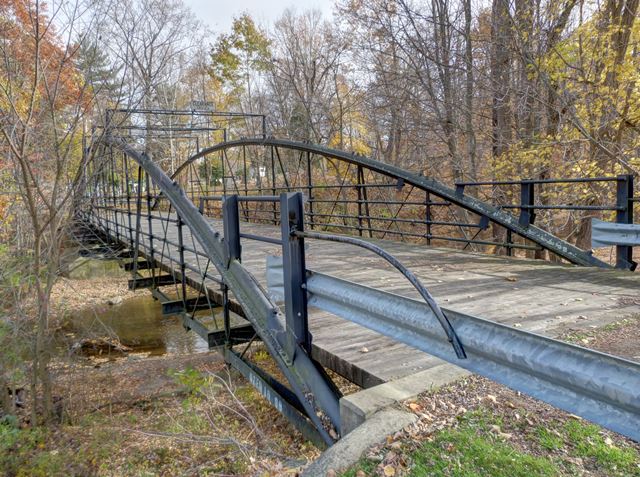We Recommend:
Bach Steel - Experts at historic truss bridge restoration.
BridgeHunter.com Phase 1 is released to the public! - Visit Now
White Bridge

Primary Photographer(s): Nathan Holth
Bridge Documented: November 11, 2015
Poland: Mahoning County, Ohio: United States
1877 By Builder/Contractor: Ohio Bridge Company of Cleveland, Ohio and Engineer/Design: William Rezner of Cleveland, Ohio
Not Available or Not Applicable
127.1 Feet (38.7 Meters)
129.0 Feet (39.3 Meters)
18 Feet (5.49 Meters)
1 Main Span(s)
5052289

View Information About HSR Ratings
Bridge Documentation
Additional Information: Melissa Brand-Welch did some research and found that in March of 1878 there was an incident of some sort on the bridge. It twisted but didn't break. The article states the bridge was built "in the past few months". So the dates of 1877/1878 appear to be correct for the construction date of this bridge.
View Archived National Bridge Inventory Report - Has Additional Details and Evaluation
View Historic American Engineering Record (HAER) Documentation For This Bridge
HAER Drawings, PDF - HAER Data Pages, PDF
View An Obituary For William Rezner
View William Rezner's Patent For This Type of Bowstring Truss Bridge

The unusual tubular top chord of this bridge immediately identifies this bridge as the patented design of William Rezner. Only a few bridges of this design survive in the entire country. This is the only known one in Ohio.
If you review the Historic American Engineering Record documentation for this bridge it is a bit confusing. It suggests in the intro that the bridge was built in 1877 by the Wrought Iron Bridge Company, but then in the actual text seems to question that finding by noting that the documentation stating that date and company refers to a "low truss" which is what pony truss bridges used to be called. This is a through truss. It also uses a patented design that was not held by Wrought Iron Bridge Company, who had its own patented design of which is was very proud of. It would be both very strange and possibly the only known example of this prolific company doing something like this. It just doesn't make sense. Seems more likely the bridge was built by the Ohio Bridge Company of Cleveland Ohio who held William Rezner's patent.
Below is a rather unique item photographed by the Historic American Engineering Record. It is a tiny model of a Rezner bowstring truss which was included as part of the package submitted to the US Government when William Rezner applied for his patent.
Information and Findings From Ohio's Historic Bridge InventorySetting/Context The bridge carries a pedestrian walkway on the drive to the cemetery. It has been closed to traffic and was converted from a vehicular bridge to a pedestrian/bike path bridge in 1999. Physical Description The 1-span, 127'-long bowstring truss bridge has upper-chord arch members composed of two elliptical sections riveted at the flanges to a plate to form a tubular section. The bridge has rolled, cruciform-section verticals, and rod diagonals. The web members have threaded ends and are bolt connected to the upper chord and lower chord at the panel points with the use of cast-iron connecting pieces. The lower chords are flat bars that have been forge-welded to threaded rod ends to make the connections at the cast-iron bearing pieces that receive the arches. The rolled I-beam floorbeams sit directly atop the lower chords. Summary of Significance See HAER OH-39 for more detailed info. Summary from HAER OH-39: "The White Bowstring Arch Truss Bridge is the only known example in Ohio of William Rezner's patented oval wrought-iron tubular arch design. Only two other examples are known to exist in the United States (as of August 1986). Bowstring arch bridges were once common, and many were built between 1850 and 1880, but few have survived. This bridge was built by the Wrought Iron Bridge Company of Canton, Ohio, which was one of America's largest and most important bridge building companies in the late 19th century. Justification The bridge is one of the 22 extant bowstring truss bridges that survive in the state. Having so many is remarkable, and even though they are "common" based on their numbers, each is an important and irreplaceable record of the development of the metal truss bridge and the ingenuity associated with the Ohio industrial development. The bridge has high significance. Bridge Considered Historic By Survey: Yes |
![]()
Photo Galleries and Videos: White Bridge
Bridge Photo-Documentation
Original / Full Size PhotosA collection of overview and detail photos. This gallery offers photos in the highest available resolution and file size in a touch-friendly popup viewer.
Alternatively, Browse Without Using Viewer
![]()
Bridge Photo-Documentation
Mobile Optimized PhotosA collection of overview and detail photos. This gallery features data-friendly, fast-loading photos in a touch-friendly popup viewer.
Alternatively, Browse Without Using Viewer
![]()
Maps and Links: White Bridge
Coordinates (Latitude, Longitude):
Search For Additional Bridge Listings:
Bridgehunter.com: View listed bridges within 0.5 miles (0.8 kilometers) of this bridge.
Bridgehunter.com: View listed bridges within 10 miles (16 kilometers) of this bridge.
Additional Maps:
Google Streetview (If Available)
GeoHack (Additional Links and Coordinates)
Apple Maps (Via DuckDuckGo Search)
Apple Maps (Apple devices only)
Android: Open Location In Your Map or GPS App
Flickr Gallery (Find Nearby Photos)
Wikimedia Commons (Find Nearby Photos)
Directions Via Sygic For Android
Directions Via Sygic For iOS and Android Dolphin Browser
USGS National Map (United States Only)
Historical USGS Topo Maps (United States Only)
Historic Aerials (United States Only)
CalTopo Maps (United States Only)


